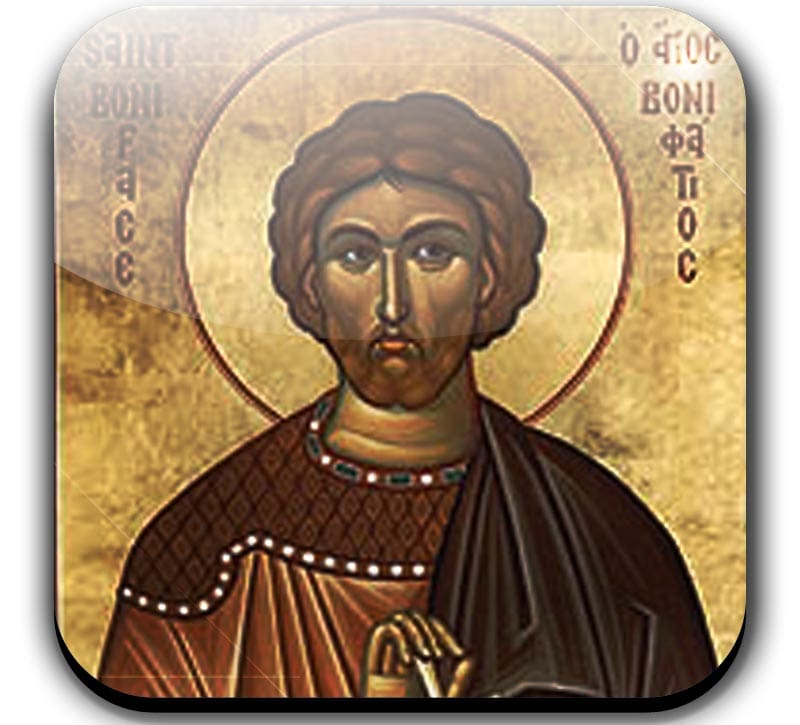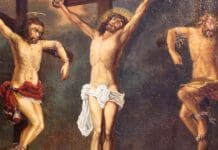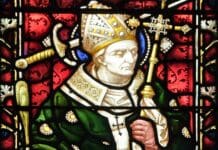 St. Boniface of Mainz is often called The Apostle of Germany. Named Winfrith by his well-to-do English parents, Boniface was born probably near Exeter, Devon, England. As a boy, he studied in Benedictine monastery schools and became a monk himself in the process. For years he lived in relative peace, studying, teaching, and praying. In his early 40s he left the seclusion of the monastery to do missionary work on the Continent. Because his first efforts in Frisia (now the Netherlands) were unsuccessful, Winfrith went to Rome in search of direction. Pope Gregory II renamed him Boniface, “doer of good,” and delegated him to spread the gospel message in Germany.
St. Boniface of Mainz is often called The Apostle of Germany. Named Winfrith by his well-to-do English parents, Boniface was born probably near Exeter, Devon, England. As a boy, he studied in Benedictine monastery schools and became a monk himself in the process. For years he lived in relative peace, studying, teaching, and praying. In his early 40s he left the seclusion of the monastery to do missionary work on the Continent. Because his first efforts in Frisia (now the Netherlands) were unsuccessful, Winfrith went to Rome in search of direction. Pope Gregory II renamed him Boniface, “doer of good,” and delegated him to spread the gospel message in Germany.
In 719 the missionary monk set out on what was to be a very fruitful venture. He made converts by the thousands. Once in Saxony, Boniface encountered a tribe worshiping a Norse deity in the form of a huge oak tree. Boniface walked up to the tree, removed his shirt, took up an axe, and without a word he hacked down the six foot wide wooden god. Boniface stood on the trunk, and asked, “How stands your mighty god? My God is stronger than he.”
In 722 the Pope consecrated him bishop for all of Germany. For 30 years Boniface worked to reform and organize the Church, linking the various local communities firmly with Rome. He enlisted the help of English monks and nuns to preach to the people, strengthen their Christian spirit, and assure their allegiance to the pope. He founded the monastery of Fulda, now the yearly meeting place of Germany’s Roman Catholic bishops. About 746 Boniface was appointed archbishop of Mainz, where he settled for several years as head of all the German churches.
Over the years he kept up an extensive correspondence, asking directives of the popes, giving information about the many Christian communities, and relaying to the people the popes’ wishes. In 752, as the pope’s emissary, he crowned Pepin king of the Franks. In his 80s and still filled with his characteristic zeal, Boniface went back to preach the gospel in Frisia. There, in 754 near the town of Dokkum, Boniface and several dozen companions were waylaid by a group of savage locals and put to death. His remains were later taken to Fulda, where he was revered as a martyr to the Christian faith.
Boniface was a man of action, but he was also sensitive to the feelings of those with whom he came in contact. His organizing genius and loyalty to Rome influenced Germany’s Christianity for centuries.


















Thank you for this well-written and accurate summary. St Boniface was, first and
foremost, a monk; by obedience but with great charisma he was a bishop; but
from the depth of his heart he was a MISSIONARY and died as such. May we
all, according to our vocation, follow his example inasmuch as it applies and
obtain his glorious intercession!
Excellent beat ! I would like to apprentice
whilst you amend your web site, how can i subscribe
for a blog site? The account aided me a applicable deal. I had been a little bit familiar of this your broadcast provided shiny clear idea